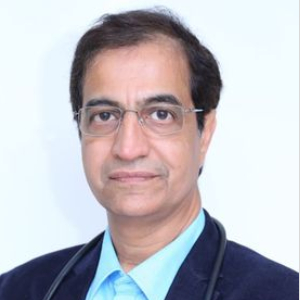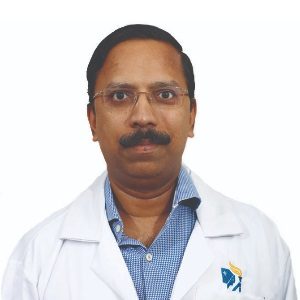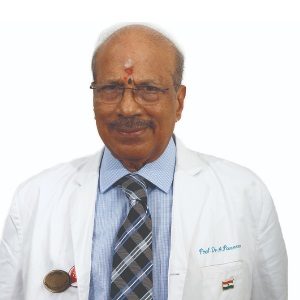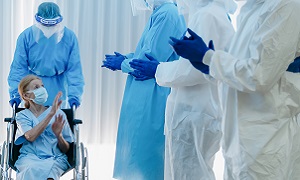Best Doctors in India for Cerebral Angiogram
- Stroke Specialist & Neurologist, Mumbai, India
- Over 30 years’ experience
- Gleneagles Global Hospital Parel Mumbai
Profile Highlights:
- Dr. Shirish M Hastak is one of the best Stroke Specialists in India with a specialization in Neurology.
- Dr. Hastak underwent training in stroke management under world-renowned neuroscientist, Dr. Vladimir Hachinski at the Western University of Canada.
- He holds more than 30 years of experience as a neurologist among which he has spent 2 decades mastering stroke management.
- Neurologist, Chennai, India
- Over 33 years’ experience
- Apollo Hospitals Greams Road
Profile Highlights:
- Dr. Arulselvan V L is one of the finest Neurologists in India, with an overall experience of nearly 33 years.
- Dr. Arulselvan was bestowed with an Excellence Award for aptitude in Anatomy in his academics.
- He takes a holistic approach to treating conditions like Myelitis, Encephalitis, Meningitis, Cerebral or Brain Aneurysm, PSR, PBC, Brain Tumor Surgery, and Sleep Disorders and performs different therapies.
- He has a periodical ‘JIAN’ under his name.
- Neurologist, Chennai, India
- Over 34 years’ experience
- Apollo Hospitals Greams Road
Profile Highlights:
- Dr. Panneer A is one of the most renowned Neurologists in India with over 34 years of research and clinical experience in the field.
- Dr. Panneer A has great expertise in Migraine treatment and neurological disorders management.
Best Hospitals in India for Cerebral Angiogram
- City: Gurugram, India
Hospital Highlights:
- Artemis Hospital, established in 2007 in Gurugram, India, is a leading multi-specialty institution known for its excellence in patient care and advanced medical technology, offering comprehensive services across specialties like Cardiology, Oncology, Neurology, Orthopedics etc.
- Renowned for its patient-focused care, Artemis Hospital combines state-of-the-art infrastructure with a team of internationally trained doctors and surgeons, ensuring the highest standards of medical treatment.
- Accredited by JCI and NABH, Artemis Hospital meets global healthcare quality and safety standards, reflecting its commitment to providing compassionate, personalized care.
- The hospital is recognized for utilizing cutting-edge diagnostic and ther*peutic techniques, ensuring patients receive accurate diagnoses and effective treatments tailored to their needs.
- City: New Delhi, India
Hospital Highlights:
- Equipped with 650 beds, BLK-Max Super Speciality Hospital is the largest stand-alone private sector hospital in Delhi.
- With over 1500 healthcare providers and 150 globally renowned super specialists, the hospital is one of Asia’s largest BMT Centres. The hospital is known for having some of the best cancer doctors in the country.
- The hospital is NABH and NABL accredited and was inaugurated by the first Prime Minister of India. Pt. Jawahar Lal Nehru.
- City: Hyderabad, India
Hospital Highlights:
- CARE Hospitals were established in the year 2000, by CARE Group.
- The multispecialty hospital has 435 beds, including 120 critical care beds, with an annual inflow of 180000 outpatients and 16,000 in-patients.
- The hospital provides specialty medical services in Cardiology, Cardiothoracic Surgery, Pediatric Cardiology, Pediatric Cardiothoracic Surgery, Neurology, Neurosurgery, Nephrology, and Urology.
- The hospital has the first dual source, 128 slice CT scanner (for high precision cardiac imaging) – the first of its kind in south India.
- The hospital offers a wide range of accommodation facilities for the convenience of its varied patient base, ranging from general wards to super deluxe rooms.
- City: Gurugram, India
Hospital Highlights:
- The CK Birla Hospital in Gurugram is a NABH-accredited multi-specialty hospital.
- The hospital strives to increase the quality of healthcare by focusing on UK NHS nurse and midwife training requirements. Policies and practices derived from the National Institute for Health and Treatment Excellence (NICE) recommendations in the United Kingdom ensuring that a strong focus on safety, high-quality clinical care, and sanitation is maintained.
- The hospital’s cutting-edge technology and facilities allow for real-time communication and seamless collaboration among caregivers, ensuring accuracy and the best possible results. Those with foreign experience and accreditations make up part of the hospital’s team of clinicians.
- City: New Delhi, India
Hospital Highlights:
- Over the last 33 years, the Fortis Escorts Heart Institute has set new standards in cardiac treatment with groundbreaking research. It is now known around the world as a centre of expertise for Cardiac Bypass Surgery, Interventional Cardiology, Non-invasive Cardiology, Paediatric Cardiology, and Paediatric Cardiac Surgery.
- The hospital has cutting-edge laboratories that perform a wide range of diagnostic tests in Nuclear Medicine, Radiology, Biochemistry, Haematology, Transfusion Medicine, and Microbiology.
- Fortis Escorts Heart Institute boasts a diverse group of bright and experienced doctors who are backed up by a team of highly qualified, experienced, and devoted support professionals as well as cutting-edge equipment such as the recently installed Dual CT Scan.
- Approximately 200 cardiac doctors and 1600 personnel currently collaborate to manage over 14,500 admissions and 7,200 emergency situations each year. The hospital now has a 310-bed infrastructure, as well as five cath labs and a slew of other world-class amenities.
- City: Mumbai, India
Hospital Highlights:
- Fortis Hiranandani hospital was established in 2007.
- The hospital is an advanced tertiary care, multi-specialty hospital equipped with 149 beds.
- The hospital is equipped with a super ICU to provide emergency medical care to critically ill patients.
- The hospital is NABH accredited.
- The critical care facility in the hospital is augmented with the state-of-the-art facilities that facilitate speedier diagnosis and efficient monitoring.
- The hospital provides specialty medical services in cardiology, orthopedic science, pediatric science, neurology, diabetic care, urology, nephrology, ENT, obstetrics, gynecology, cosmetic surgery, bariatric surgery, neuro and spine care.
- City: Mumbai, India
Hospital Highlights:
- Fortis Hospital in Mulund is a 315-bed multi-speciality tertiary care hospital with five JCI accreditations that offers a wide variety of diagnostic and treatment services. The Fortis Hospital in Mulund delivers patient-centred treatment with cutting-edge technology, highly skilled and experienced surgeons, and paramedical staff.
- This institution houses Maharashtra’s largest multi-organ transplant centre. It is also the first heart transplant centre in western India to conduct 100 or more consecutive heart transplants in under four years. It is the only hospital in the city to have multi-organ transplants and has handled the youngest patient for angioplasty. Fortis Hospital Mulund now boasts the first advanced surgical robot in central Mumbai.
- Cardiology and heart surgery, urology, nephrology, neurosciences, orthopaedics, digestive care, emergency and critical care, and maternity care are among the services provided by the hospital.
- City: Kolkata, India
Hospital Highlights:
- Fortis Hospital, Anandapur, Kolkata is a world-class super-speciality equipped with the latest technologies in the medical world.
- The hospital is NABH accredited.
- This state-of-the-art facility specializes in cardiology and cardiac surgery, urology, nephrology, neurosciences, orthopaedics, digestive care, emergency care and critical care.
- The hospital, governed by integrated Building Management System (IBMS), has a pneumatic chute system, for quick vertical and horizontal transportation between floors, facilitating speedy transfer of patient specimens, documents, reports, and medicines to the concerned departments.
- The hospital also has a nephrology department with over 28 advanced dialysis units.
- City: Bengaluru, India
Hospital Highlights:
- Fortis Hospital Bannerghatta, Bengaluru was established in 2006.
- The hospital is a 276 bedded multi-specialty tertiary care facility.
- The hospital specializes in cutting-edge medical technology and dedicated patient care services.
- The hospital is equipped with state-of-the-art technologies like trans-radial angioplasty, trans-abdominal cardiac surgery, and computerized TKR navigation surgery.
- The hospital provides specialty medical services in cardiology, cardiac surgery, orthopedics, neurology, neuro-surgery, GI, and Minimal Access Surgery (MAS).
- City: Gurugram, India
Hospital Highlights:
- Fortis Memorial Research Institute (FMRI) is a premier multi-super-specialty, quaternary care hospital, known for its exceptional international faculty, top-tier clinicians, super-sub-specialists, and specialized nurses, all supported by cutting-edge technology.
- It is the flaship hospital of Fortis Healthcare Limited, part of IHH Healthcare Berhad, a leading integrated healthcare services provider in India. As one of the country’s largest healthcare organizations, Fortis operates 28 healthcare facilities with over 4,500 operational beds (including O&M facilities) and more than 400 diagnostic centers (including joint ventures).
- Recognized as one of the top hospitals in India, FMRI serves as a leading referral center and aspires to be the ‘Mecca of Healthcare’ for India and beyond. Its 11-acre campus is a testament to its commitment to providing world-class healthcare.
- Accredited by JCI and NABH, FMRI is dedicated to maintaining the highest standards of healthcare quality and safety, ensuring that every patient receives the best possible care. The hospital’s reputation is further enhanced by its state-of-the-art facilities and innovative medical practices.
Cerebral Angiogram
Cerebral angiogram is an image that can help your doctor find blockages or any kind of abnormalities in the blood vessels of your neck and your head. To get the image, the doctor needs to perform a diagnostic test termed a cerebral angiography. The test is performed with the help of a contrast medium, which the doctor injects into your blood.
Purpose
The procedure is used to detect or confirm abnormalities within the blood vessels in the brain, which can include:
- an aneurysm, a bulge or a sac that develops in an artery due to weakness of the arterial wall
- arteriovenous malformation, a tangle of dilated blood vessels that is known to disrupt normal blood flow in your brain.
- atherosclerosis, a narrowing of the arteries.
- vasculitis, an inflammation of the blood vessels
- a blood clot
- a brain tumor.
- a tear in the wall of an artery, which is known as a vascular dissection.
- a stroke
The test can be performed for multiple reasons which include evaluating the arteries of the head and neck before surgery. The test can help provide additional information on abnormalities which are seen on MRI or CT of the head, such as blood supply to a tumor. The test can also be performed as preparation for other medical treatments, such as the surgical removal of a tumor. It can be performed as preparation for minimally invasive treatment of a vessel abnormality as well.
The test can help diagnose the causes of several symptoms such as:
- Severe headaches
- Dizziness
- Slurred speech
- Blurred or double vision
- Loss of coordination or balance
- Weakness or numbness
Preparation

First, you should talk to your doctor regarding how you should be preparing. You might not be able to eat or drink anything after midnight before the procedure. It is also likely that your doctor will ask you to stop taking any medications that can increase the risk of bleeding. These can include blood thinners, anti-inflammatory medications or aspirin.
If you have any kind of allergies or medical conditions, you will need to inform your doctor in advance. Sometimes people are allergic to the contrast material which is used during the procedure. Let your doctor know about any allergies that you have including allergies to anesthesia or the contrast material.
Also, the risk of complications can also increase if you have certain illnesses and conditions. For example, if you are suffering from diabetes or kidney disease, then the contrast material might cause temporary damage to the kidneys.
Procedure
For this test, your healthcare team will be including a radiologist, a radiology technician, a neurosurgeon or a neurologist specializing in interventional radiology.
You will most likely be sedated before the procedure. To stabilize your head, a strap, tape or sandbags are going to be used. It is quite important that you lie still during the test.
First, your doctor will be sterilizing an area of your groin. He/she will insert a long, flexible tube known as a catheter, through your blood vessels and into your carotid artery. This is the blood vessel in your neck responsible for carrying blood to the brain.
A contrast dye will flow through the catheter and into the artery. From there, it will be traveling to the blood vessels in your brain. You might receive a warm feeling as the dye flows through your body. Your doctor will take several head and neck X-rays. During this time, you might be asked to hold still or even hold your breath for a few seconds.
After this is done, your doctor will remove the catheter and place a dressing over your insertion site. The entire procedure generally takes between one to three hours.
After the procedure
You will next be sent to a recovery room, where you will need to lie for around two to six hours before you are sent home. At home, take care not to lift any heavy objects or overexert yourself for a minimum of one week.
If you experience any of the following, call your doctor:
- Signs of a stroke, including slurred speech, weakness, numbness or vision problems
- Redness and swelling at the catheter insertion site
- Swelling or coldness of the leg
- Dizziness
- Chest pain
A radiologist will be able to interpret your results when they are available. These results will be shared with you by your doctor to discuss follow-up tests or treatment.
Risks
Cerebral angiography carries some risks with it, although they are rare. They generally include:
- Stroke
- Damage to the blood vessels, including an artery getting punctured
- Blood clots, which can form around your catheter tip
- Make sure to discuss all the risks carefully with your doctor before you undergo the procedure.














